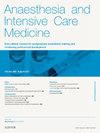The poisoned patient
IF 0.3
Q4 ANESTHESIOLOGY
引用次数: 0
Abstract
Poisoning is a common reason for admission to the intensive care unit. Most cases are due to deliberate self-harm with common poisons; however, there are occasional unusual poisons which require more detailed assessment. Patients are often obtunded or unwilling to co-operate so a knowledge of toxidromes can help to identify symptoms that are related to a particular group of drugs, and therefore influence management. The management of poisoned patients is generally supportive, including measures to reduce absorption and increase elimination, but can also include the use of specific antidotes and techniques to remove poisons.
中毒的病人
中毒是入住重症监护病房的常见原因。大多数案件是由于故意使用常见毒药自残;然而,偶尔有不寻常的毒物需要更详细的评估。患者往往不愿意或不愿意合作,因此对毒瘤的了解可以帮助识别与特定药物组相关的症状,从而影响管理。中毒患者的管理通常是支持性的,包括减少吸收和增加消除的措施,但也可以包括使用特定的解毒剂和清除毒素的技术。
本文章由计算机程序翻译,如有差异,请以英文原文为准。
求助全文
约1分钟内获得全文
求助全文
来源期刊

Anaesthesia and Intensive Care Medicine
ANESTHESIOLOGY-
CiteScore
0.50
自引率
0.00%
发文量
152
期刊介绍:
Anaesthesia and Intensive Care Medicine, an invaluable source of up-to-date information, with the curriculum of both the Primary and Final FRCA examinations covered over a three-year cycle. Published monthly this ever-updating text book will be an invaluable source for both trainee and experienced anaesthetists. The enthusiastic editorial board, under the guidance of two eminent and experienced series editors, ensures Anaesthesia and Intensive Care Medicine covers all the key topics in a comprehensive and authoritative manner. Articles now include learning objectives and eash issue features MCQs, facilitating self-directed learning and enabling readers at all levels to test their knowledge. Each issue is divided between basic scientific and clinical sections. The basic science articles include anatomy, physiology, pharmacology, physics and clinical measurement, while the clinical sections cover anaesthetic agents and techniques, assessment and perioperative management. Further sections cover audit, trials, statistics, ethical and legal medicine, and the management of acute and chronic pain.
 求助内容:
求助内容: 应助结果提醒方式:
应助结果提醒方式:


